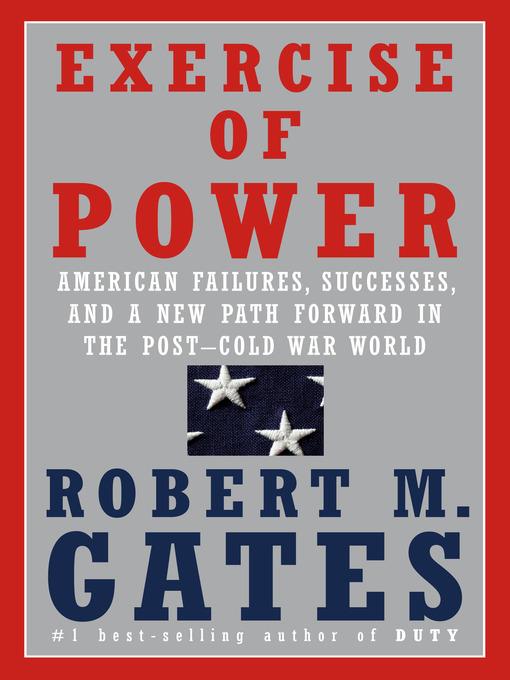
Exercise of Power
American Failures, Successes, and a New Path Forward in the Post-Cold War World
کتاب های مرتبط
- اطلاعات
- نقد و بررسی
- دیدگاه کاربران
نقد و بررسی

May 4, 2020
The former defense secretary to Presidents George W. Bush and Barack Obama explores foreign-policy missteps—including overreliance on defense secretaries—in this incisive treatise. Gates (Duty) deplores the overmilitarization of American foreign policy and the atrophy of the “non-military instruments” of diplomacy, propaganda, and aid. He argues that the State department, rather than the U.S. military, should have led reconstruction efforts in Iraq but lacked the resources and expertise to do so; that social media campaigns should be beefed up to stoke public discontent in Iran; and that America needs to better coordinate the sticks and carrots of economic sanctions, development assistance, and trade. He applies these themes in case studies of a few triumphs, such as Bush’s initiative to combat AIDS in Africa, and many quagmires, including failed interventions in Libya and Syria and the conundrum of North Korea’s nuclear weapons. Gates participated in many of the White House situation room episodes he describes, and he’s both a sharp critic of Washington, D.C.’s policy-making bureaucracies—“multiple people trying to play the same cello at the same time”—and a shrewd analyst of the dilemmas they wrestle with. The result is a judicious yet bracingly contrarian take on military and foreign policy from the ultimate insider.

May 1, 2020
Former Secretary of Defense Gates offers a sweeping view of the uses and limitations of American power in the modern era. The U.S. remains the world's foremost superpower, notes the author at the beginning, but that doesn't mean that we're not challenged at every turn: China is growing economically, with its political influence broadening; Russia "is aggressively threatening and attempting to destabilize Western democracies and dominate its neighbors"; and small states from North Korea to Iraq and Syria remain hot spots even as several NATO members become ever more autocratic. Recent political leaders, Gates holds, have failed to understand and project American power properly, certainly as compared to Eisenhower, Reagan, and George H.W. Bush. The author relies on a half-century of service to critique the presidents who have come after them. On the military front, for instance, he urges the application of Bush's cautious approach to Iraq in the first Gulf War: Define the objectives clearly, bring overwhelming force, and then get out. Career diplomats, though bureaucratized, are essential to the application of nonmilitary power. Economic power constitutes another instrument. Here, Gates takes Trump to task for an isolationist approach that leaves the door open to China to take the place of the U.S.--as it has been with its international infrastructure projects in 60 countries, all intended to hasten the transport of critical resources to China. Other failures are the invasion of Iraq in 2003, although the author disputes the claim that George W. Bush knowingly lied about weapons of mass destruction: "U.S. and foreign intelligence agencies simply were in error, with grave consequences." Though critics of Gates will dismiss some of his programmatic recommendations--such as, say, don't replace one dictator with another without a good plan in place--it's refreshing to see a secretary of defense call for the use of the military as a choice of last resort. Recommended reading for foreign policy and geopolitics wonks.
COPYRIGHT(2020) Kirkus Reviews, ALL RIGHTS RESERVED.

Starred review from June 1, 2020
In this latest work, former secretary of defense Gates (Duty) examines the role of American power and its relation to foreign policy decisions since the collapse of the USSR. Failure to utilize the multilayered dimensions of power have left the United States as a bewildered actor on the world's stage where Washington, DC, once had the lead role, Gates maintains. This work is not a political treatise, and remains accessible throughout as the author defines 15 components as tools that administrations have used to define power. Themes emerge from one foreign policy action to the next, most notably that limited mission scopes have yielded successes while mission creep, or the gradual expansion of a project, has led to failures. Relating to military success, Gates notes that buy-in from the affected population is necessary in order for a mission to succeed, but the buy-in should not be set up with unrealistic expectations. VERDICT This important work dives deep into the past three decades of American foreign policy to provide a realistic picture of how key policy decisions were crafted. Highly recommended for those wanting an examination of America's role within the global community.--Jacob Sherman, John Peace Lib., Univ. of Texas at San Antonio
Copyright 2020 Library Journal, LLC Used with permission.

























دیدگاه کاربران